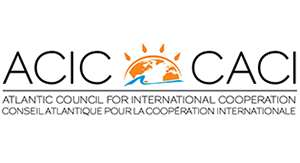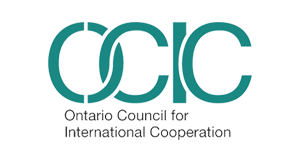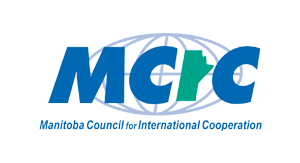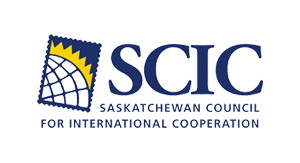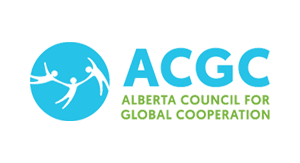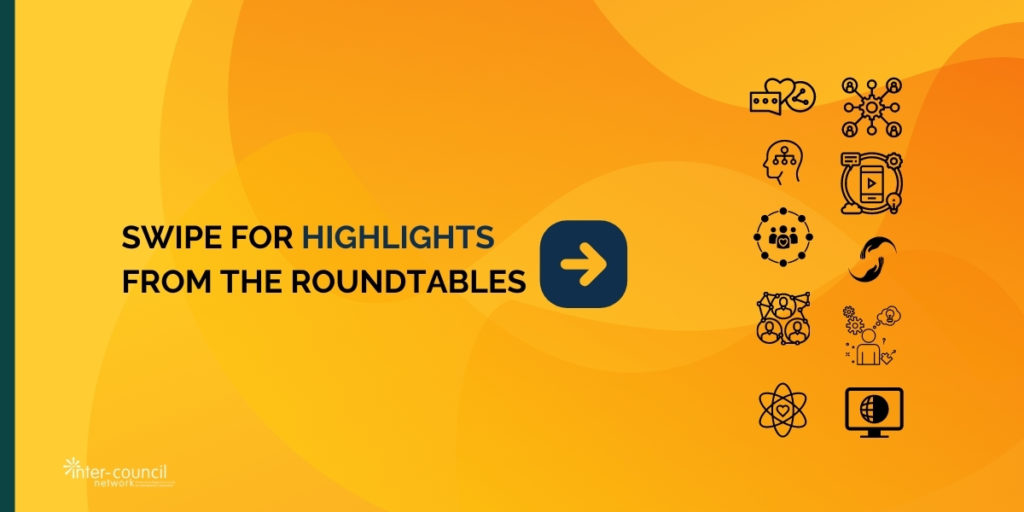
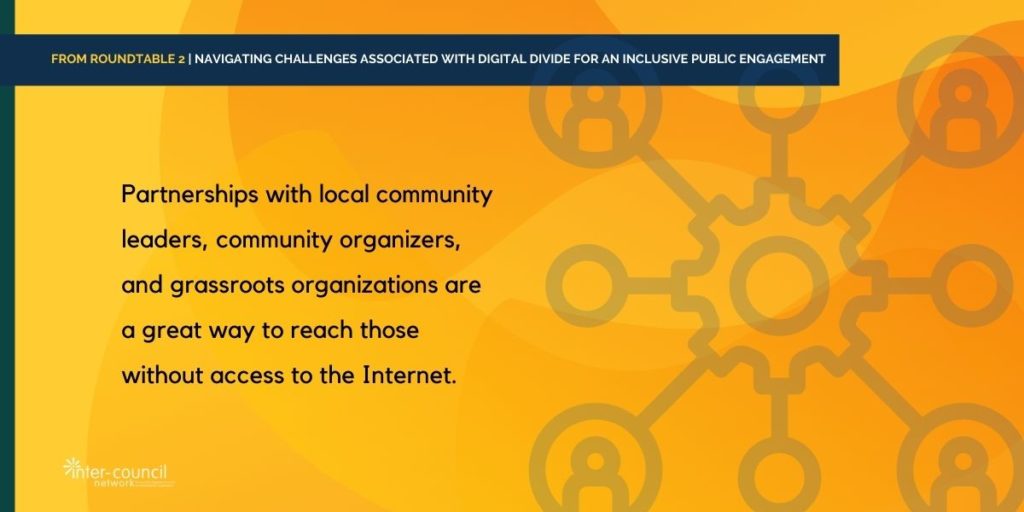
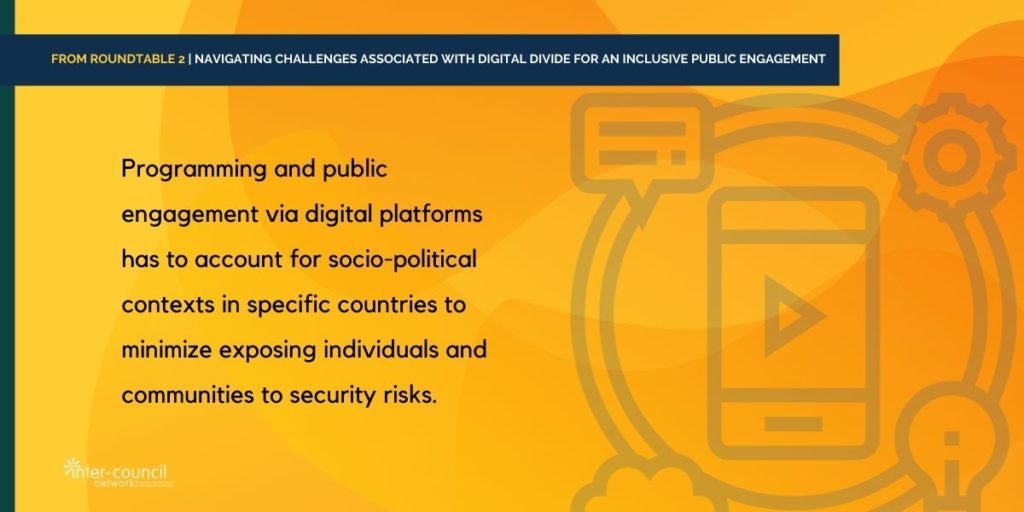
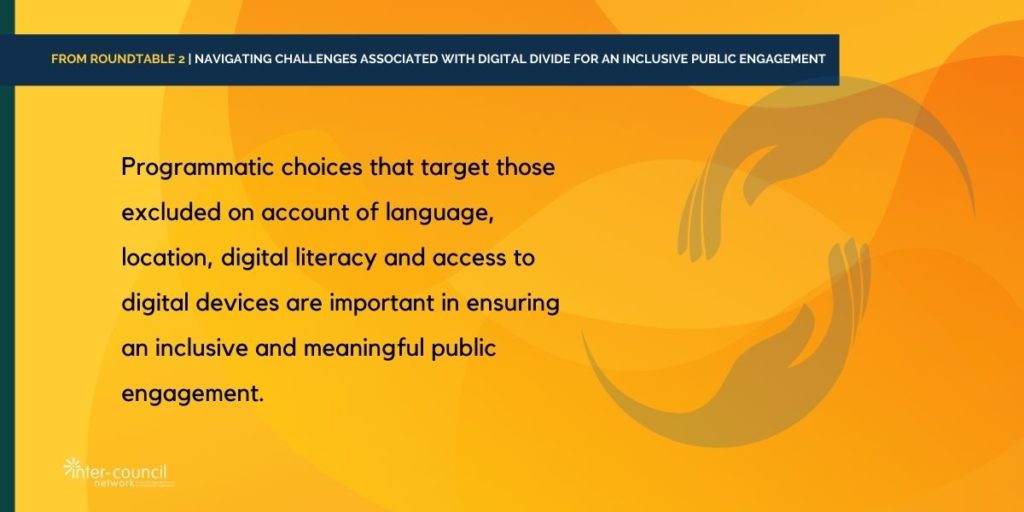
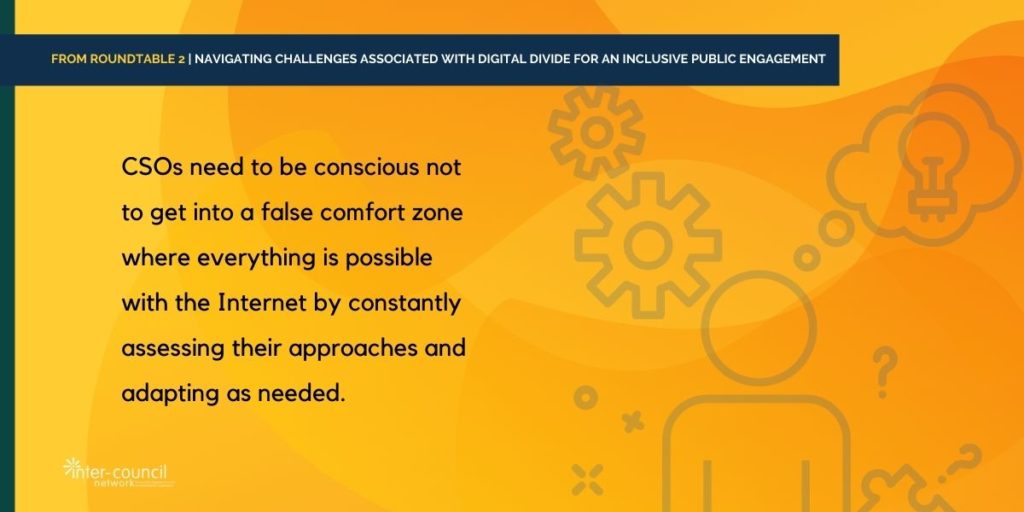
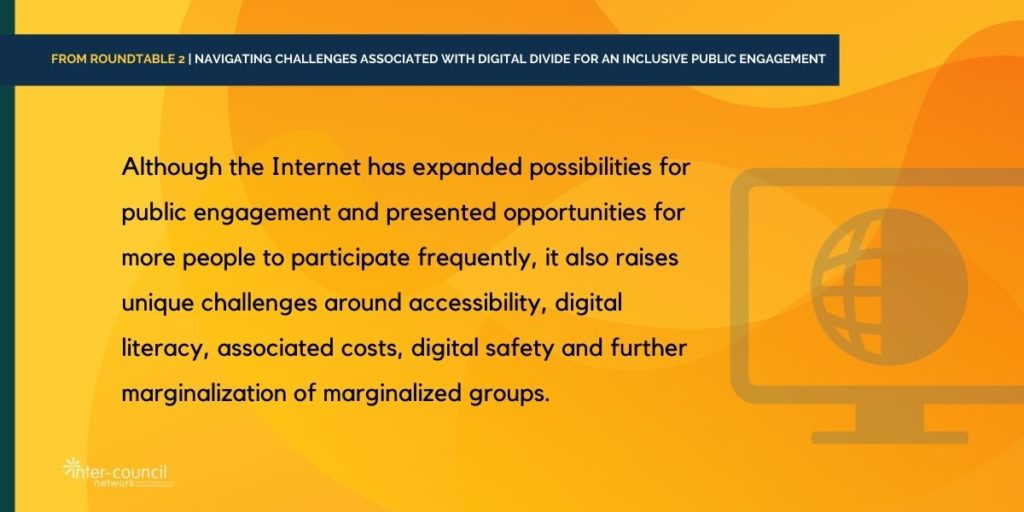
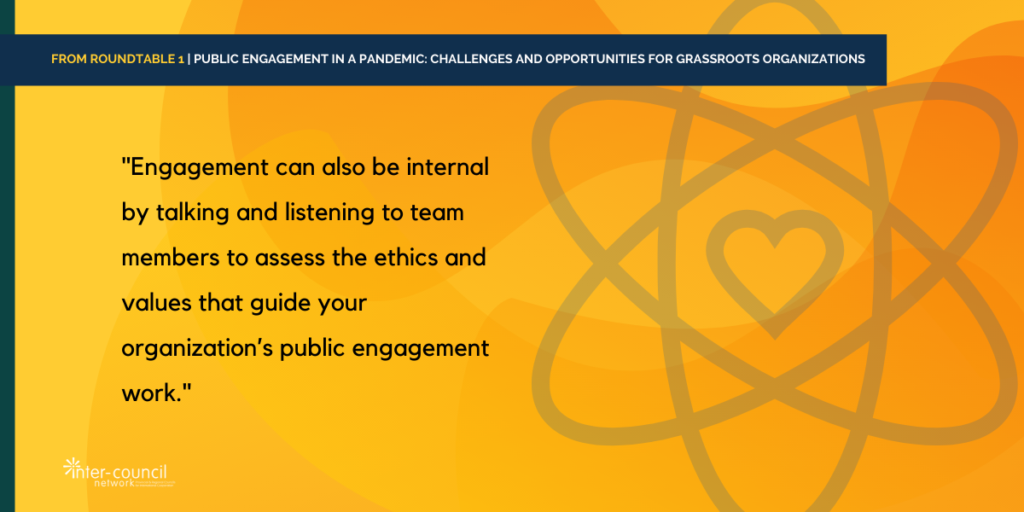
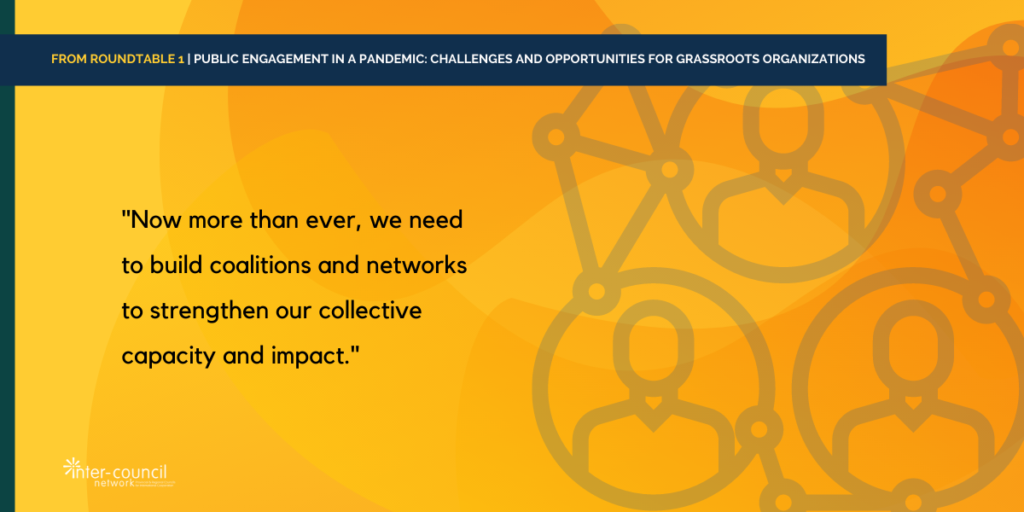
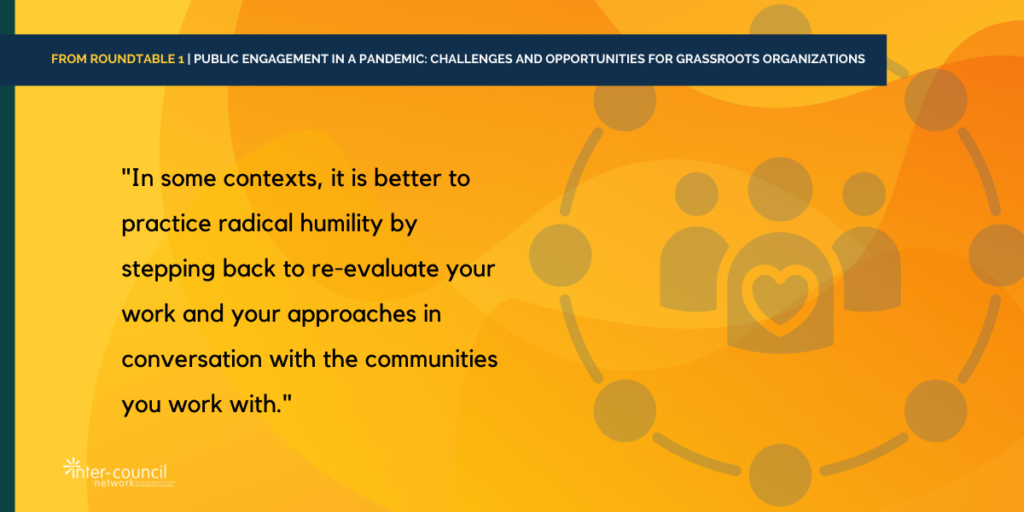
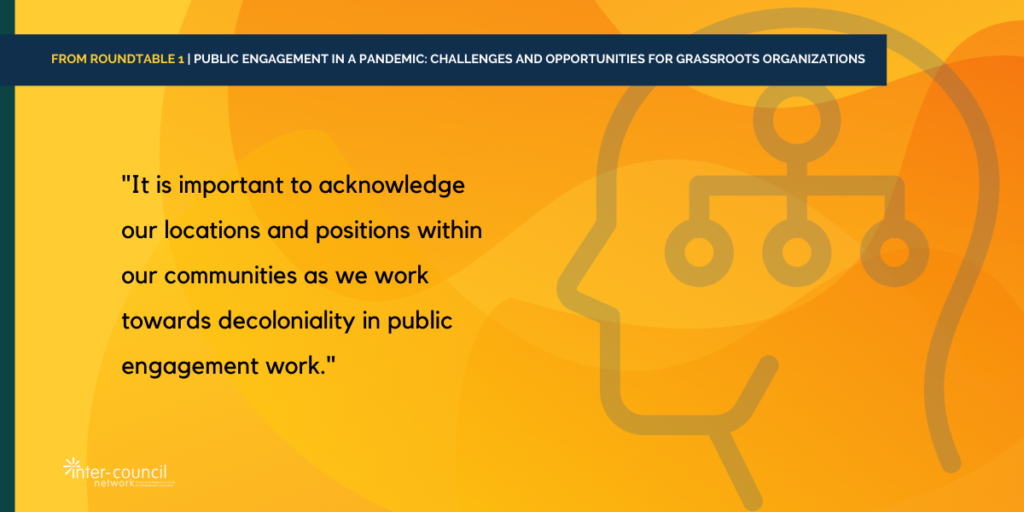
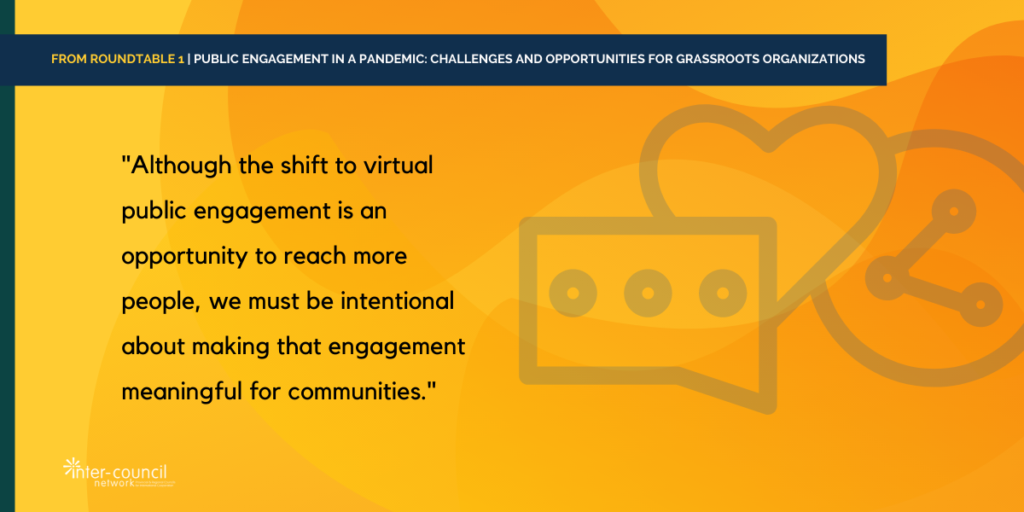
To examine how public engagement has evolved in the pandemic, the Inter-council network (ICN) convened two virtual roundtable sessions with local and global civil society organizations. In these roundtable sessions, the CSOs reflected on the impact of changes on public engagement and shared promising practices for a more inclusive and transformative public engagement in and beyond the pandemic. These sessions inform ICN’s broader research project on feminist, anti-racist, and decolonial approaches in public engagement.
To start, the ICN would like to acknowledge and appreciate the following people who, representing various CSOs, participated in the roundtables enriching the sessions with their insights, experiences, and expertise: Miriam Nobre; Flora Trebi-Olennu; Genevieve Huneault; Nohely Guzman; Valerie Akinyi; Ian Mangenga; Hailey Vidler; Prince Dela Yao; Catherine Pappas; Daphne Morgen; Tina Sweeney; Sean Burke; Ruth Taylor; Rebecca Jacobs; Marina Melanidis; Joy Masuhura; and Gabriel Newman.
The first roundtable focused on the shift in public engagement for grassroots organizations. With the pandemic, organizations pivoted and moved some of their public engagement work online. This shift, although challenging for all, is easier for organizations with readily available resources, expertise, and infrastructure. For some grassroots organizations, the change may be more challenging. By convening grassroots organizations in Canada, Kenya, South Africa, Bolivia, Brazil, and Ghana, the aim is to highlight unique experiences of grassroots organizations, to learn from grassroots organizations, and to understand how best to support grassroots organizations in their public engagement work.
This roundtable brought together a diverse group of grassroots organizations including Trebi Kuma Ollennu Foundation for Community Development which builds healthy communities in Canada and Ghana; Engage Nova Scotia which works towards an inclusive and resilient Nova Scotia; Social Root Consulting which builds ethical and sustainable business and development practices in Canada; Jasy Renyhê which fights for the rights of women and Indigenous peoples and knowledges in Bolivia; Digital Girl Africa which bridges the gap between women and technology in South Africa; Making a Difference Sisters which fights for the wellbeing of girls and women in Kenya; Sempreviva Organização Feminista which transforms unequal gender relations in Brazil; and Development Complements which supports health care institutions in Ghana.
The shift in public engagement has expanded opportunities for grassroots organizations. Digital technologies have changed the form and the frequency of public engagement activities; there are more public engagement activities, and more people can participate in different ways. This has created space for individuals and groups who typically would not have access to particular forms of participation. Although this inclusivity is important, the challenge for grassroots organizations has been to make this participation meaningful and transformative for marginalized groups. This can include such decisions as adjusting the digital platforms used for public engagement to allow secure and consistent participation or re-channeling funding streams to enable people to purchase Internet data.
Equally important, the pandemic has foregrounded care work and the dynamics that shape care work. This has, undoubtedly, informed grassroots organizations’ reflexivity work reevaluating their guiding principles and ethics. They have had to prioritize care work internally at the organizational level with team members and externally with community members and partners resulting in a change in programs, projects, and relationships with communities, partners, and funders. This work has ended strained relationships, strengthened existing relationships, and created new relationships fostering trust among CSOs, funding partners, and communities.
These opportunities are, however, coupled with a unique set of challenges. The Internet has simultaneously expanded space for public engagement and further disadvantaged those without disposable income to acquire devices and stable Internet. Even with access, there are other divides around digital literacy, the cost of Internet data, availability of single or multiple devices, digital safety, and accessibility. As policy analyst Nanjira Sambuli observes, accessibility and availability of digital technologies does not necessarily lead to a more equal world. Therefore, as digital worlds become prominent grassroots organizations recommend being more conscious and responsive of these digital inequalities to avoid (re)producing forms of inequalities.
The second roundtable which focused on the digital divide and public engagement echoes and underscores the insights from the first roundtable. Inadequate resources and uneven availability of technological infrastructure determine people’s access to devices and the Internet which further determines who gets to participate and how they participate in public engagement. This session highlighted specific measures that CSOs take to ensure marginalized groups are included in a meaningful, participatory and transformative way.
This roundtable assembled a diverse group of CSOs including Heart Links which supports community development in Northern Peru; HOPE International which mobilizes resources, donors, volunteers and teams towards change in the world by focusing on water infrastructure, food security and livelihoods; Community Forests International which works on forest restoration and conservation in Canada and Tanzania; Youth for Nature which empowers youth around the world to mobilize in response to the climate and ecological crisis; World Neighbours Canada which supports communities in Honduras, Burkina Faso, and Nepal; Women Transforming Cities which helps build cities where girls and women have real social economic and political power; Youth Unmuted which elevates young people’s voices particularly displaced youth in Greece and Mexico; Cuso International which empowers and builds capacity for global communities to create lasting change and foster economic opportunity, gender equality and better health; and Alternatives which advocates for social justice and human rights.
CSOs have adopted different measures to navigate the digital divide challenges highlighted earlier. For example, making programmatic choices that target those excluded on account of language, location, digital literacy and access to digital devices is an intentional way to reach the marginalized. To ensure the safety of individuals and communities in volatile political environments, CSOs switch to digital platforms that are less susceptible to surveillance. This minimizes the risk and encourages people to participate. CSOs have also adopted a hybrid system that merges online and offline participation; building partnerships with local community leaders, community organizers, and grassroots organizations helps reach those without access to the Internet.
In conclusion, it is evident from these roundtable sessions that the pandemic has clearly reoriented public engagement. A more ethical framework to public engagement is crucial for meaningful and transformative participation. The ICN, via this research project, aims to provide strategic leadership in this regard. In collaboration with local and global CSOs, the ICN will empirically explore and articulate an ethical framework to public engagement grounded on feminist principles.
By Judyannet Muchiri, Policy Officer | Judyannet@acic-caci.org
Judyannet is a gender equality advocate, researcher, and writer. Her work sits at the intersection of gender, youth, and digital advocacy. She has experience working with non-profits in Kenya and other African countries in the areas of gender equality, civic participation, and digital advocacy. Her doctoral research focuses on safe spaces for young women’s civic participation in Kenya. Judyannet also writes fiction.
